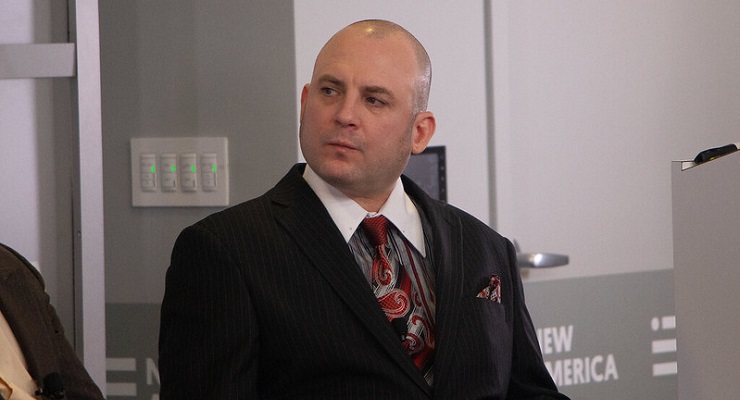
He was America’s No. 1 Nazi for 25 years and he has a message for Australian politicians: if you want to curb the growth of extremist movements, focus on educational measures and deradicalisation programs.
Jeff Schoep, the former leader of the National Socialist Movement (NSM) in the United States before walking away from the group in 2019, now heads Beyond Barriers, an organisation that seeks to help people find their way out of extremist movements.
Schoep and Beyond Barriers have written to the Australian Parliamentary Joint Committee on Intelligence and Security’s extremism inquiry about how they helped radicalised individuals. He tells Crikey that politicians need to focus on ensuring schools’ curriculums provide people with exposure to different cultures and philosophies so they are less likely to be drawn to cult-like movements that thrive on the fear of others’ faith and cultural traditions.
Schoep’s pathway into extremism and membership of the NSM was through reading the history of World War II. His grandfather fought on the German side and a passion for history sent him down the national socialist rabbit hole.
“I found the National Socialist Movement in the United States and joined that and within two years I was appointed the national director of that organisation and led it for 25 years,” he said. “It was the largest Nazi party, the largest organisation of its kind, by the time I left.”
The movement held rallies and marches, distributed Nazi materials and even developed video games such as first-person shooters based on the ideology. It also had a record label that produced white nationalist music.
Schoep says politicians should understand that extremists will see anything that heavily criticises their ideology as an invitation to double down, and resist attempts to get them to walk away from an extremist movement. Finding a way of persuading them their ideology is harmful and getting them to a point where they can be “off-ramped” before they do harm is the best approach.
He says that during his time in national socialist ranks, people questioning his views, his grandfather’s warnings that only death or prison would come from participating in the movement, and visits by the FBI all pushed him to press harder.
Girlfriends also tried to warn him. “I was dating a lot of different girls that were not a part of the group, that were outside of the group,” he said. “A lot of times they would say: ‘I want to see what you do even though I don’t agree with it. Can I come along and see what you do?’ I’d say ‘Sure, come along’.
“One after the other, literally one girlfriend after another, kept saying to me: ‘Jeff, this is a cult. This is like a cult. You are like a cult leader.’ And it would make me so angry at the time because I would say: ‘No, it’s not like that. I don’t know why you think that.’
“I thought there was something wrong with all these girls I was dating. There was nothing wrong with them. There was something wrong with me. I couldn’t see it.”
His road out of extremism came from varying influences, including conversations with people from different racial and religious backgrounds who told him about the impact his views had on them.
Schoep doesn’t believe bans on individuals who express extreme views necessarily work because they can be seen by the extremist as a validation or vindication of their views.
He speaks from experience. He has been banned from entering countries including the United Kingdom, Canada and Germany.
“At the time I wore that like a badge of honour,” he said. “I would brag about that. I burnt the letter, I think, from the German government on camera … People would come up and say things like, ‘Man, I wish I was doing so much that I would get banned by these different governments’.
“I don’t think those things are very effective and I don’t think that they work.”








I’m sure the LNP are grateful for Schoep’s input but as they are determined to dumb Australia down there is no way they will be taking his advice., A dumb, compliant electorate benefits their election chances and doesn’t arc up when they rip us all off for the benefit of their billionaire mates.
The last thing they want is a country full of wokes who research, think things through and come up with sensible conclusions.
I’d like to know more about what changed his mind. I’m willing to bet it was empathetic and non confrontational because as he said, every bit of pressure made him double down. I’m just thinking that we could learn more from his personal account of what happened.
It was empathetic – he spoke face to face with people from different backgrounds and it made him gradually shift. He was already ‘deradicalising’ before he left the organisation in March 2019.
Thanks for the intelligent insight into these weird others.
I’m unsurprised that the telex machine from Langley VA still works.
Must have history in curriculum from primary school. High school more expanded history subjects. Past the basic historical facts of any nation, is the injustice (rarely mentioned), the race question, and of course the beneficial achievements (mentioned). My mother survived ww2 as slave labour in factory in Germany. I have anecdotal history of that time plus how hard it was for war refugees in aust after the war, from a racist perspective.
Nowadays, many non uni educated people don’t know very much history apart from headline bytes in the media. Don’t know geography either, which makes it hard to understand what is happening where and what caused the situation. Tulsa, for example, is now being brought to the american publics notice! An horrific event of 1921!
Ultimately dumbing down people is excellent for any nation. Allows narratives that support the ruling elites.
Excellent article – thanks.